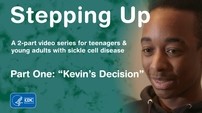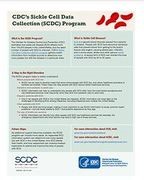Help Teens with Sickle Cell Feel Empowered About Their Health
June 18, 2018

|
As young people age, their health care needs will change. The teenage years are often the time when one's health care transfers from a pediatric doctor, a doctor who treats children, to a doctor who focuses on treating adults.
Young people with sickle cell disease (SCD) will experience this period in their lives, which is also known as ‘transition'. During transition, young people with SCD should learn to become responsible for their own health and healthcare decisions. Transitioning care from pediatric to adult care is a big step towards adulthood and gaining independence, but it can be a scary and challenging process to navigate.
Sickle cell disease (SCD) is an inherited blood disorder that can cause pain, anemia, infection, and other serious health problems. Although the exact number of people with SCD is unknown, estimates suggests that approximately 100,000 people in the United States are affected by SCD.
This World Sickle Cell Day, observed each year on June 19th, the Centers for Disease Control and Prevention (CDC) is sharing two resources on transition to help teenagers and young adults with SCD ‘step up' and to take ownership of their own health. These resources aim to support and to empower young people with SCD to manage and to prioritize their health and well-being.
 Mikeia Green's Personal Story
Mikeia Green's Personal Story
In 2012, Mikeia Green left home to attend college out of state. For most of her childhood, her mother made sure her SCD was well managed, but once she left for college it became Mikeia's responsibility to know her body's needs. Read how she managed her doctor's appointments, prepared herself for emergencies, and how she prioritized her health, school, activities, and a new social life to stay healthy in college.
"I knew there were a lot of things I could do to help myself stay healthy. I didn't want to end up in the hospital and miss class," said Mikeia Green about her experience managing SCD in college. When Mikeia left her home in Arizona to attend college in California, it was the first time she was away from her mother..."
Read her full story here.
 Stepping Up: A 2-Part Video Series for Teenagers & Young Adults with SCD
Stepping Up: A 2-Part Video Series for Teenagers & Young Adults with SCD
Watch a new 2-part video series focusing on health care transition among teenagers and young adults living with SCD. The videos feature Kevin and Calvanay, two young adults with SCD, who share their thoughts about transition, how it has affected them, and how they've overcome challenges. Watch Kevin's and Calvanay's videos. Share these videos with a teenager or a young adult living with SCD to help support his or her transition!
 NEW! Check out our new Sickle Cell Data Collection (SCDC) Program Fact Sheet!
NEW! Check out our new Sickle Cell Data Collection (SCDC) Program Fact Sheet!
Where do people with SCD live? What kinds of health problems do they face? These are some of the questions CDC hopes to answer by collecting data through the SCDC program. Read the fact sheet to learn how the SCDC program is helping to improve the lives of people with SCD! Access the SCDC Fact Sheet here
Learn more about CDC's work in SCD surveillance
Visit CDC's Sickle Cell Disease Surveillance History and learn how various projects (RuSH, PHRESH, SCDC) have contributed to our understanding of SCD today.
Find more resources on SCD on our webpage.
Help spread the word! Share these resources on social media, and don't forget to follow us on Twitter @CDC_NCBDDD to stay-up-to-date on all of our activities!







